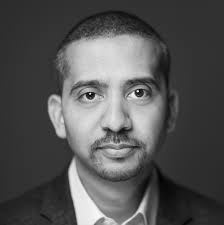
Update: Since this post is receiving many-fold more visitors than this blog normally receives in the whole day, here is the TL;DR for those who are too dim to read, or too lazy to do so: Hasan should not engage in guilt-by-association against others when the tactics are so easily turned against himself. That is all.
End update
As I am trying to withdraw from Twitter food-fights I did not want to comment on this on that medium. But, since I have a platform of this weblog, I did think it would appropriate to point out a peculiar sort of behavior by Mehdi Hasan, a relatively prominent commentator in the UK who is becoming more well known in the USA.
A few days ago I saw Hasan criticizing Rand Paul on Twitter for the fact that his father was involved in a controversy around racist newsletters in the 1990s. I thought it was strange for Hasan to imply that the guilt of the father should echo down through the generations, The main issue I have with this sort of behavior is that Hasan himself was saying that homosexuals were pedophiles and non-Muslims lived like animals down into the 2000s, far more recently than the Ron Paul Newsletters. Hasan has disavowed these views, and my own view is that unless otherwise shown one can probably accept that he’s changed his positions (he has, for example, denounced the traditional Islamic punishment of death for apostasy in the last decade).
Hasan should probably more careful than most in holding someone’s past against them, let alone the transgressions of someone’s father (no matter the context). The grace that he is given, he should give to others.
His behavior indicates to me that he believes he is prominent and powerful enough that no one will point out the hypocrisy of his behavior in asking forgiveness of his own past while holding the past of the parents of ideological opponents against them.
But the main reason I’m posting now is that today I saw something again where Hasan attempted to play guilt-by-association: this time against Tulsi Gabbard. In particular, he criticized her for appearing on Tucker Carlson’s show, which is bad because Carlson is a bad person (a racist according to Hasan). Of course, some of us are aware that Hasan has a long-time grievance against Gabbard for being Islamophobic. It wasn’t a coincidence that he criticized her.
My problem is that Hasan works for Al Jazeera, which owned by the government of Qatar. Qatar is a repressive, reactionary, and racist state. I say this from personal experience having visited. Of course, I myself had fun in Qatar, because I stayed at a nice hotel, and drank wine and dined at Nobu. But we all know the lives that the Asian and African work-force live to maintain the techno-reactionary utopia (of course Western people are treated well in Qatar).
No one is pure and lives on an island. The United States itself has blood on its hands, and all Americans who are citizens of this democracy have some share of that. I don’t begrudge progressive journalists who work for Al Jazeera English. A job is a job today in journalism, and Al Jazeera is a big organization with diverse views. But, the fact is that within Al Jazeera its non-English arm often trades in racism and religious bigotry, and the ultimate ownership is in the hands of an autocratic monarchy.
To me, this means that employees of Al Jazeera English should show a bit of humility and acceptance of moral complexity when it comes to complicity and associations. As it is, quite often they are among the most woke and self-righteous exemplars of the opinion journalism class. Tucker Carlson and Fox News are perhaps nasty and racist in Hasan’s view, but Al Jazeera is sponsored by an incredibly classist and reactionary government. Should the latter negate our acceptance of Hasan’s assertions that he is a progressive person?
Hasan’s problem with Rand Paul is clearly with the views of Rand Paul. His problem with Tulsi Gabbard is that he believes she is Islamophobic. He should focus on these issues, instead of attempting guilt-by-association, because he and many other self-righteous pompous journalists live in gossamer glass houses.